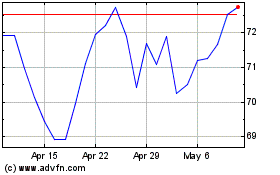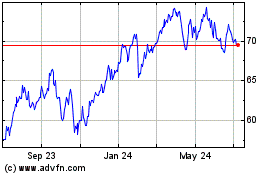By Leslie Scism, Tess Stynes and Lauren Pollock
Hail storms, market volatility and persistently low interest
rates stung more insurers in the first quarter, as four of the
biggest companies in the sector on Wednesday reported sharply lower
operating profits.
Life insurers MetLife Inc., Prudential Financial Inc. and
Lincoln Financial Group reported lackluster investment income,
while property and casualty giants Allstate Corp. and Chubb Corp.
logged sharp increases in catastrophe losses for the quarter.
Among the major insurers that reported Wednesday, Chubb was the
only one to report an increase in operating income, a key measure
in the insurance industry that excludes capital gains and losses in
the companies' big investment portfolios.
Prudential shares declined 3.2% after hours, followed by
MetLife, which dropped 3%. Operating earnings at both companies
declined more than expected. The other stocks were little
changed.
MetLife said weak hedge-fund performance dented its investment
income, which declined 5.5% to $4.71 billion. That followed similar
comments about hedge funds earlier in the week from American
International Group Inc.
Prudential, in comparison, logged a slight 0.4% increase in
investment income but said its business took a hit on fluctuations
in a portfolio that includes hedge funds, private equity and real
estate. And Lincoln Financial blamed lower investment income for
declines in fee income and earnings at its retirement plan services
segment.
Insurers earn a substantial portion of their income from the
investments they make with customers' premium dollars, holding them
until claims are due. As such, they have faced a major headwind in
the protracted low-interest-rate environment in the U.S. and many
other parts of the world. Both MetLife and Prudential keep a sliver
of their investment portfolio in private equity and hedge funds,
which are supposed to earn more than the high-quality bonds they
predominantly hold.
MetLife and Prudential are two of the nation's biggest sellers
of retirement-savings products known as annuities. Under some
versions known as variable annuities, insurers earn fees based on
amounts invested by customers in stock and bond funds, while their
profits on other types are tied to the insurers' own investments in
bond markets. MetLife cited unfavorable market performance and
lower investment margins for disappointing performance in its
retail unit, but said annuity sales were up 14%.
MetLife said in January that it would divest a large chunk of
its operations, including its variable-annuity business, as part of
a plan to slim down and reduce some of the capital burden it would
face under new federal regulations as "systemically important." In
March, a federal judge ruled for MetLife in the New York company's
challenge of the designation, and that ruling is now being appealed
by the government.
Prudential said it took a charge in its individual annuities
segment to reflect market performance, while logging gross sales
for individual annuities of $2 billion.
Within the property and casualty market, Allstate had already
warned that its results would take a big hit on catastrophe losses
incurred in the period. The insurer primarily blamed hailstorms in
the southern U.S., one of which was the largest to ever hurt the
company. Its catastrophe losses grew to $827 million in the quarter
from $294 million a year earlier.
Chubb, meanwhile, reported a surge in catastrophe losses to $258
million from $51 million a year earlier. For its part, MetLife,
which has a car and home insurance business, also cited an
"unfavorable catastrophe experience" in its report.
Those comments echo sentiments expressed in recent weeks by
Travelers Cos., car insurer Progressive Corp. and Kemper Corp., all
of which highlighted a spike in claims from punishing hailstorms in
March.
In all, at MetLife, the largest U.S. life insurer by assets,
operating income declined to $1.33 billion, or $1.20 a share, from
$1.64 billion, or $1.44 a share, a year earlier. Analysts polled by
Thomson Reuters expected $1.38 a share. Revenue, meanwhile, slipped
2.5% to $16.61 billion.
At Prudential -- which earns about half of its profit abroad,
mostly from Japan -- operating earnings declined to $997 million,
or $2.18 a share, versus the $2.37 a share expected by analysts.
Revenue at Prudential, with its annuities, retirement-income and
asset-management businesses, fell 4.4% to $11.29 billion.
Lincoln Financial posted an 11% slide in operating income to
$314 million, or $1.25 a share. Analysts had called for $1.49 a
share.
Allstate, meanwhile, said operating earnings dropped 48% to $322
million, or 84 cents a share, while Wall Street predicted 68 cents
a share. Revenue slipped 0.9% to $8.87 billion, though insurance
premiums increased.
And Chubb, formed earlier this year when ACE Ltd. acquired Chubb
in a nearly $30 billion deal and took its name, reported operating
earnings of $1.02 billion, or $2.26 a share, beating the $2.16 a
share expected by analysts. Net premiums were $5.48 billion.
Write to Leslie Scism at leslie.scism@wsj.com, Tess Stynes at
tess.stynes@wsj.com and Lauren Pollock at
lauren.pollock@wsj.com
(END) Dow Jones Newswires
May 04, 2016 17:55 ET (21:55 GMT)
Copyright (c) 2016 Dow Jones & Company, Inc.
MetLife (NYSE:MET)
Historical Stock Chart
From Mar 2024 to Apr 2024

MetLife (NYSE:MET)
Historical Stock Chart
From Apr 2023 to Apr 2024
